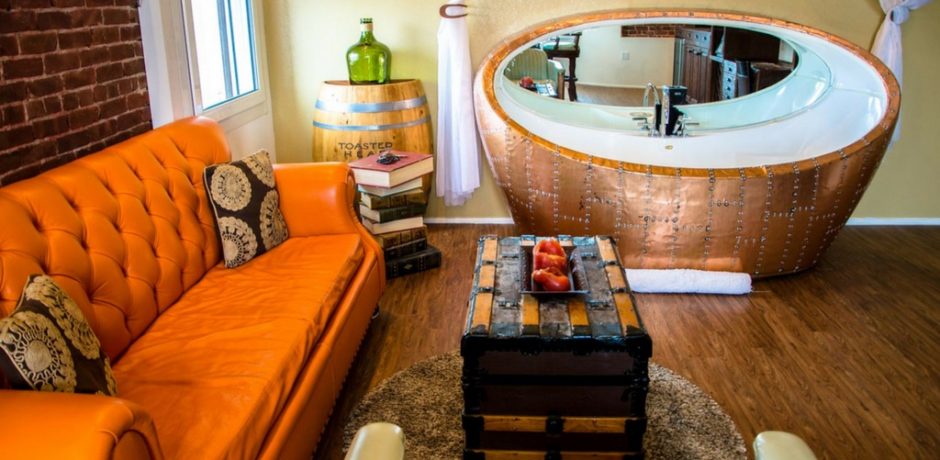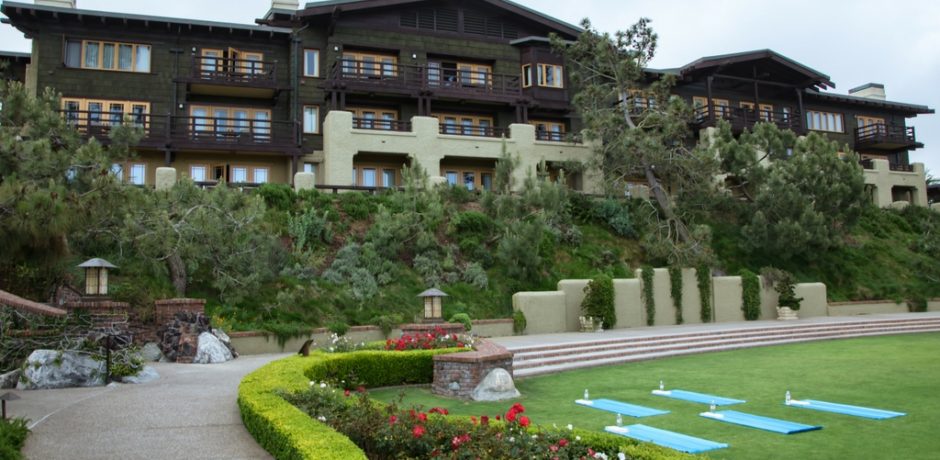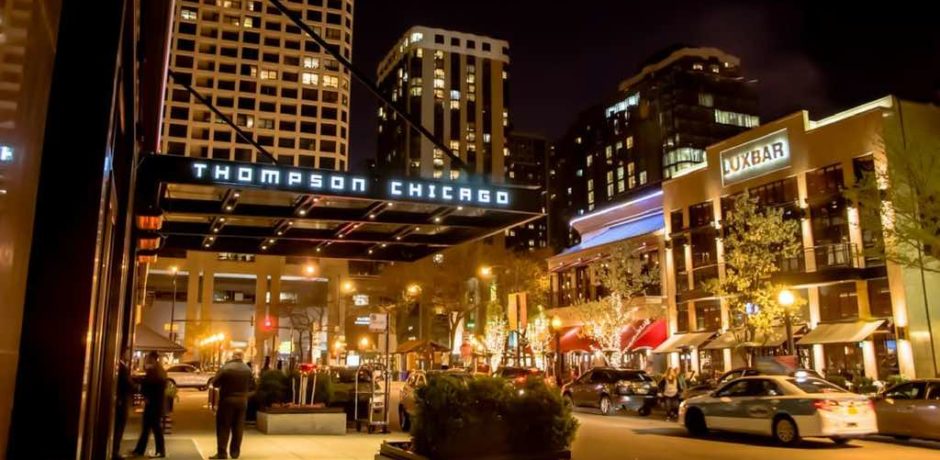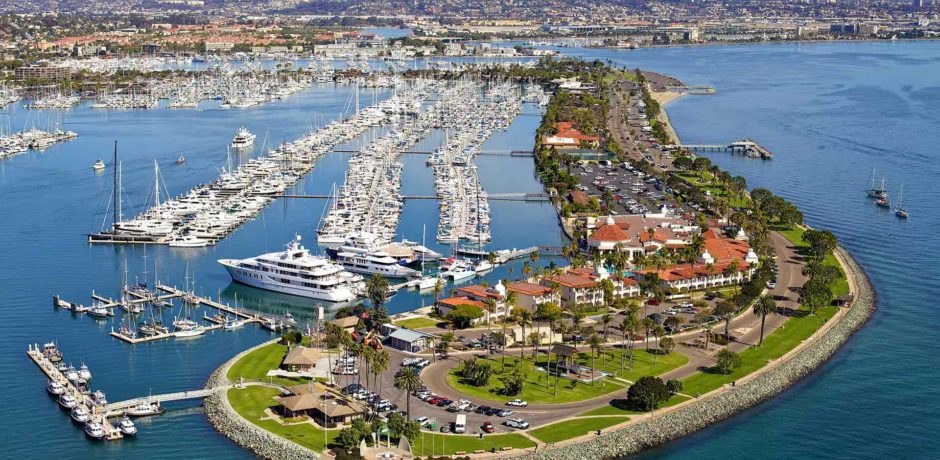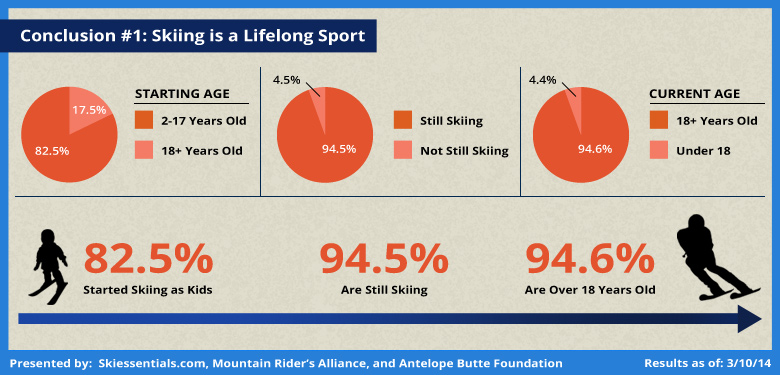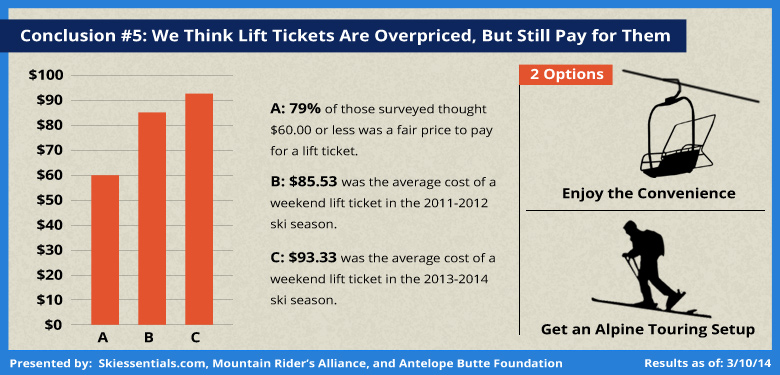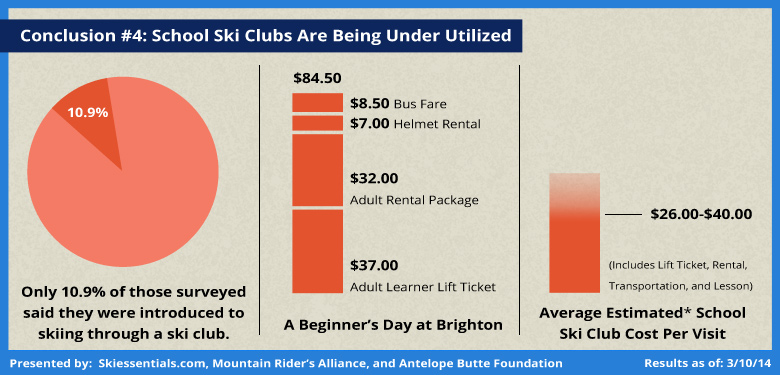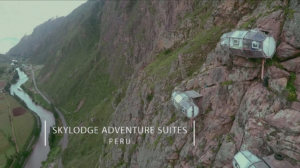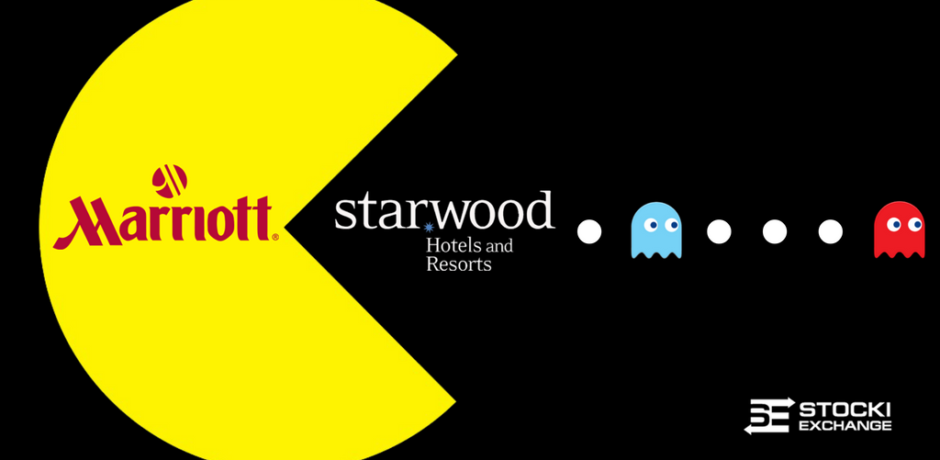Category: Hotels
During a recent filming trip for the new luxury hotel TV show, Great Escapes, I spent 8 days exploring San Diego, CA visiting some of the best hotels the city has to offer! The trip took my Producer Morgan and me to the center of San Diego’s Gaslamp Quarter to the 35-room boutique hotel called The Keating. (more…)
During a recent filming trip for the new luxury hotel TV show, Great Escapes, I had the opportunity to stay at the renowned L’Auberge Del Mar hotel in just outside San Diego, CA. Located just steps from the Pacific Ocean, this hotel is the epitome of Southern California luxury and provides the perfect combination of activity, amenities, and relaxation for just about anyone. Read my full hotel review of the L’Auberge Del Mar, located in Del Mar, CA, just outside San Diego. (more…)
During a recent 8-day filming trip for the new luxury hotel TV show, Great Escapes, I was able to stay and film some of the best hotels in all of San Diego, California. When planning the trip I knew that I wanted to stay at a variety of hotels to make sure I was able to experience all that San Diego had to offer. Thankfully, I was able to find four unique hotels that were a perfect fit for the new TV show and diverse enough to reflect all of San Diego. For anyone who can’t decide on where to take their next vacation, don’t overlook San Diego as a destination. Here is my hotel review of our stay at The Lodge at Torrey Pines! (more…)
During a recent filming trip for the new luxury hotel TV show, Great Escapes, I was lucky enough to stay at one of the windy city’s best hotel, the Thompson Chicago. The hotel offers beautiful views of the Chicago skyline and Lake Michigan, all while being just steps from the famous Magnificent Mile. Keep reading for my in-depth review of the Thompson Chicago hotel and why it should be on the top of anyone’s list who is looking for a downtown hotel while visiting Chicago! (more…)
While filming for the new luxury hotel TV show, Great Escapes, I spent 8 days exploring San Diego, CA visiting some of the best hotels the city has to offer! Anyone looking for a family friendly beach resort close to downtown San Diego, the Kona Kai Resort & Marina should be at the top of your list! (more…)
During a non-typical Monday-night trip in March, I headed off to film a new hotel feature segment for my new TV show, Great Escapes, where I visited a city within a city. A residential and resort community located on the shores of Lake Michigan, Bay Harbor is the epitome of Northern Michigan lakeside-side luxury retreat. The development stretches along five miles of shoreline and includes an equestrian, yacht, and golf club as well as being scattered with retail shops, restaurants, private condos and homes, and my destination, the Inn at Bay Harbor. (more…)
During my travels, I’ve had many amazing hotel experiences and I’ve had some that are a complete disaster. From impossible to connect to WiFi to getting asked to pay for a room upgrade because they didn’t have any more regular rooms available, I’ve heard it all. Watch this video where I reenact some of the things that hotels do that really annoy their guests.
(more…)
Over the past decade and a half, regional ski resort visits throughout the U.S. have been largely stagnant or in decline. Per Snowsports Industries America 2015 Fact Sheet, nationwide visits peaked at 60.5 million in the 2007/08 season and dropped to an almost 15 year low of 52.8 million in the 2015/16 season. Why is this and what does the industry need to do to remain viable long-term?
Lack of Early Adoption
First and foremost, early adoption is key in determining whether or not a consumer will EVER get involved. In a 2014 Ski Essentials survey, almost 32% of people started on the mountain between the ages of 2-5 and a whopping 82.5% began before the age of 18. Of those that started before the age of 18, 94.5% are still skiing.
Sadly, even high retention among those that get started early may not be enough to save snowsports long term. In the late 70’s there were roughly 735 resorts in the US. By the 2013 season, that number was down to 470, says Unofficial Alpine. That means the nearest ski hill is getting further and further away from the average family, making it even more of a hassle to get involved for those who are interested.
Exorbitant Costs
Above and beyond issues around interest and access, the increasing cost of participation has also put a damper on consumer behavior. In the 2013/14 season, the average weekend lift-ticket price was $93.33 per Ski Essentials. Factor in equipment rentals and food and you’re talking about well over a $150 day…per person! Now you may be thinking, “yeah, but those are Colorado prices,” and you would be correct. But cutting the number in half for smaller local hills still makes a day trip for a family of four roughly $300. Numbers like these are a still a significant investment for many families and a tall barrier to entry for new consumers interested in giving the sport a try. To take it a step further, look at what it would cost to BUY all new equipment for a family of four. Not to mention having to replace equipment for growing kids around every two seasons. The total costs skyrocket.
Solutions
First and foremost, ski resorts must work to build relationships with local schools if they want to help groom the next generation of lifetime skiers. Roughly 11% of those surveyed by Ski Essentials said they were introduced to skiing through a ski club. Beyond that, the average estimated ski club trip costs between $26-$40 unlike the typical family trips mentioned above. That means there are swaths of youngsters out there with the potential to get into skiing while young and at an affordable rate. I call that untapped potential.
Furthermore, those small and medium “beginner” resorts need to rethink the overall costs of a day of skiing. Discounted lift tickets are helpful, but the price of equipment rentals and food often make a seemingly affordable day anything but.
Second, everything possible must be done to keep small local ski hills open. They are key to ushering new skiers into the fold. So much so, that over 60% of skiers surveyed say they learned on local hills with less than 1600 feet of elevation. And once they’re involved, they tend to stay involved for life. Many of these ski hills are community funded and/or non-profits. If you’re passionate about snowsports, make sure you advocate for continued funding for these type of local ski hills and help with fundraising efforts to keep them alive.
Industry consolidation will play a key role here as well. If large players like Vail Resorts continue to purchase and invest in small properties (like they did recently with Wisconsin’s Wilmot Mountain) there may be hope for the little guy. Investments in diversifying entertainment options at these properties creates viability by bringing in much-needed non-skiing revenue. However, this type of consolidation can also lead to price increases, which could ultimately be detrimental to the industry as a whole, as research shows that cost of entry is a large barrier to new consumers.
Finally, the industry must embrace dynamic pricing as quickly as possible. This means taking everything from the weather to on-premise hotel inventory into account when setting prices vs. working with a dated static pricing structure. It means offering discounts for those who purchase lift tickets in advance, raising prices as the date approaches, and potentially cutting them drastically on days with low turnout or poor weather forecasts. While this sounds complicated, companies like Liftopia have been helping resorts implement this model for the past decade. Mammoth Mountain Ski Area told Bloomberg that it increased its advance sales by 15% the first season it implemented the model.
Only time will tell if the industry is going to respond appropriately. Will the major players in Colorado put today’s profits ahead of nurturing tomorrow’s customers?
Do you work at a ski resort and have an opinion you would like to share? Leave a comment below or email me at john@stockiexchange.com.
Entrepreneur and Hospitality Consultant, John Stocki, has been hired as a Travel Expert and Segment Producer for a new luxury hotel TV show, Great Escapes. Stocki will be traveling the globe visiting unique and luxurious hotels to be featured on the internationally distributed show scheduled to begin airing in Fall of 2017.
Great Escapes Show Brief
Great Escapes is a 30-minute 39-episode television series created and produced by Bellum Entertainment. Based in Los Angeles, CA, Bellum Entertainment is known for producing other award-winning shows that include Corrupt Crimes, Animals Unleashed, Justice Served: Murderous Affairs, Fix It & Finish It, and many others. Together with Bellum Entertainment’s Co-Executive Producer Chris Loud and Producer Morgan Burke-Beyers, who are both Michigan natives, John will be filming and producing the remaining episodes from remote locations around the world with final editing and production being completed in Los Angeles, CA.
Great Escapes has been acquired by Sky Vision, the international distribution division of SKY, and is being distributed domestically by Bellum’s dedicated sales team. The show will be broadcast to ~75% of major city markets throughout Europe, Asia, and the United States on multiple platforms. Agreements have already been accepted for the show to broadcast on Video On Demand services including Hulu, Amazon Video, and Roku starting in 2019. A conservative estimate of global viewership is at 2 million+ and the show will be broadcast internationally for over 10 years.
John is ready to travel and expose some hotels and destinations throughout the world that are truly Great Escapes. Follow the development of the show and John’s travels via the Great Escapes Facebook Page, YouTube Channel, and Website.
Hotels Features, Sponsorships, & Product Placement Opportunities
John’s company, Stocki Exchange, a hospitality consulting firm, has also been hired to lead and manage all Sponsorship and Product Placement opportunities for the show. Companies and/or products we’re interested in featuring include luxury or unique hotels/resorts, casinos, international airlines, luxury travel products (luggage, headphones, watches, etc…), online travel agents, tour companies, Country or State Tourism Organizations, Destination Management Companies (DMC), hospitality suppliers, and alcohol producers.
Are you or do you know someone who would be interested in receiving additional information regarding sponsorship/product placement opportunities? Send an email to john@stockiexchange.com and download a PDF show brief. (Updated June 2, 2017)
About John
Born and educated in the United States, John Stocki launched his career on a global scale working in Australia, United Arab Emirates, China, and the US, as well as traveling and training in over 30 countries and 29 states throughout the US. His passion was developed in the hospitality industry where he worked with international luxury hotel brands in marketing, public relations, and eCommerce roles. He brings a straightforward approach, laced with direct personal experience, to his special and unique style which makes his company – Stocki Exchange – so distinctive.
In 2012, after returning to the US, John started the Stocki Exchange – A hospitality consulting firm for hotels & resorts, restaurants, breweries, and bars. He now acts as the company’s CEO and is also a successful Keynote Speaker for topics including travel, and hospitality sales & marketing. John is also a Consulting Partner with Mocinno International, a global hospitality management company with offices in Copenhagen, Stockholm, Palma, Dubai, London, Amsterdam, and Michigan.
He is a Contributor for The Huffington Post, Startup Grind, and Hostfully. During his travels for the filming of Great Escapes, John will be writing destination travel features, posting reviews of his experiences at hotels, as well as sharing his travels on all his social media accounts. Interested in having your brand or product included in a destination feature? Email John.
Be sure to Follow John’s travels via Social Media
Facebook: http://facebook.com/johnstocki
Twitter: http://twitter.com/j_stocki
Instagram: http://instagram.com/johnstocki
Linkedin: https://www.linkedin.com/in/johnstocki13
Medium: http://medium.com/@johnstocki
Follow the Stocki Exchange:
Facebook: http://facebook.com/stockiexchange
Twitter: http://twitter.com/stockiexchange
Instagram: http://instagram.com/stockiexchange
Website: http://stockiexchange.com
Marriott International’s (MI) recent purchase of Starwood Hotels & Resorts Worldwide for $12.2 Billion dollars, makes it the largest hotel chain in the world. MI now controls 30 different brands, almost 5,800 properties and 1.1 million rooms in more than 110 countries worldwide. That’s more than 1 out of every 15 hotel rooms in the world per the Los Angeles Times.
Marriott controlled brands now include: Bulgari Hotels and Resorts, The Ritz-Carlton and The Ritz-Carlton Reserve, St. Regis, W, EDITION, JW Marriott, The Luxury Collection, Marriott Hotels, Westin, Le Méridien, Renaissance Hotels, Sheraton, Delta Hotels by MarriottSM, Marriott Executive Apartments, Marriott Vacation Club, Autograph Collection Hotels, Tribute Portfolio, Design Hotels, Gaylord Hotels, Courtyard, Four Points by Sheraton, SpringHill Suites, Fairfield Inn & Suites, Residence Inn, TownePlace Suites, AC Hotels by Marriott, Aloft, Element, Moxy Hotels, and Protea Hotels by Marriott.
Marriott now trumps both Hilton’s 773,000 and IHG’s 766,000 rooms, according to STR. The integration of both companies loyalty programs, Marriott Rewards and Starwood Preferred Guests, was a “central, strategic rationale for the transaction” according to Marriott CEO, Arne Sorenson, during a recent interview with the Associated Press.
Starwood put itself up for sale in April 2015. The Stamford, Connecticut, company had struggled to grow as fast as its rivals, particularly in “limited service hotels,” which are smaller properties which don’t have restaurants or banquet halls. They are often located on the side of the highway, near airports or in suburban office parks.
To acquire Starwood Hotels & Resorts Worldwide, Marriott International had to outbid China’s Anbang Insurance Group
What does this mean for Loyalty Program Members?
For now, Starwood and Marriott will maintain separate loyalty programs due to competitive partnerships the two have in place. Starwood has a credit card deal with American Express as well as close partnerships with Delta Air Lines and Uber. Marriott has a much larger program that includes partnerships with Chase bank and United Airlines. “We have to see how those partnerships evolve,” said Sorenson.
However, members of Starwood and Marriott’s loyalty programs will be able to link their accounts together. Gold Elite members in one program will get Gold status in the other. Platinum Elite members will get Platinum in the other. Marriott Silver members will see Starwood’s lowest category, Preferred Plus.
Marriott Rewards members now have access to 1,300 more properties around the world. In maintaining the exception service Starwood’s members were accustomed to, members can now convert their points to Marriott points at a 3:1 ratio.
What does this mean for Marriott International?
This merger represents a huge opportunity for Marriott. They have an unprecedented leverage over the markets they’re in due to the size and diversity of their brand portfolio. They have brands covering every niche as well as the resources to easily rebrand and renovate properties if needed to ensure market fit.
“We’ve got an ability to offer just that much more choice. A choice in locations, a choice in the kind of hotel, a choice in the amount a customer needs to spend,” said Sorenson. He also mentioned that he believes all 30 of the brands now under the Marriott umbrella will remain intact.
While more traditional takeover models have included immediately rebranding properties to promote the acquirer, Marriott has taken a savvier approach. Maintaining a unique look and feel for each brand in their portfolio creates broad consumer appeal without looking like the 800 pound gorilla in the marketplace.
What remains to be seen is whether or not consumer sentiment towards the behemoth will change now that they’re the biggest kid on the playground. I believe that as long as they keep their roughly 85 million rewards members happy, public perception may not really have any substantial impact on the brand.
What does this mean for the Industry?
Moving forward, branded hotels (i.e. Hilton, Marriott, etc.) will likely continue to gain market share through acquisition and drive brand loyalty by anticipating consumer behavior and rewarding it with ever-changing loyalty programs. Non-branded hotels will constantly be looking for ways to provide unique value through differentiation of services, amenities, location, and/ or price versus their competition.
With the majority of travel purchases happening online and the growth of smartphone/ mobile transactions, hotel giants such as Marriott, IHG, Best Western, and Choice have significant budgets from franchise fees that can fund the necessary investments into digital platforms to reach today’s consumers. Independent hotels and small chains will continue to struggle to compete digitally against the large chain hotels due to lack of resources, experience, and budget. Both will also be challenged by Online Travel Agents (OTA’s) such as Priceline, Expedia, and TripAdvisor whose spending power and digital reach continues to grow. Though they are not immune to the struggles of long-term brand loyalty either.
If you’re a Marriott Rewards or Starwood Preferred Guest member, I would love to get your thoughts on the merger. Email me at John@StockiExchange.com or contact me here.
